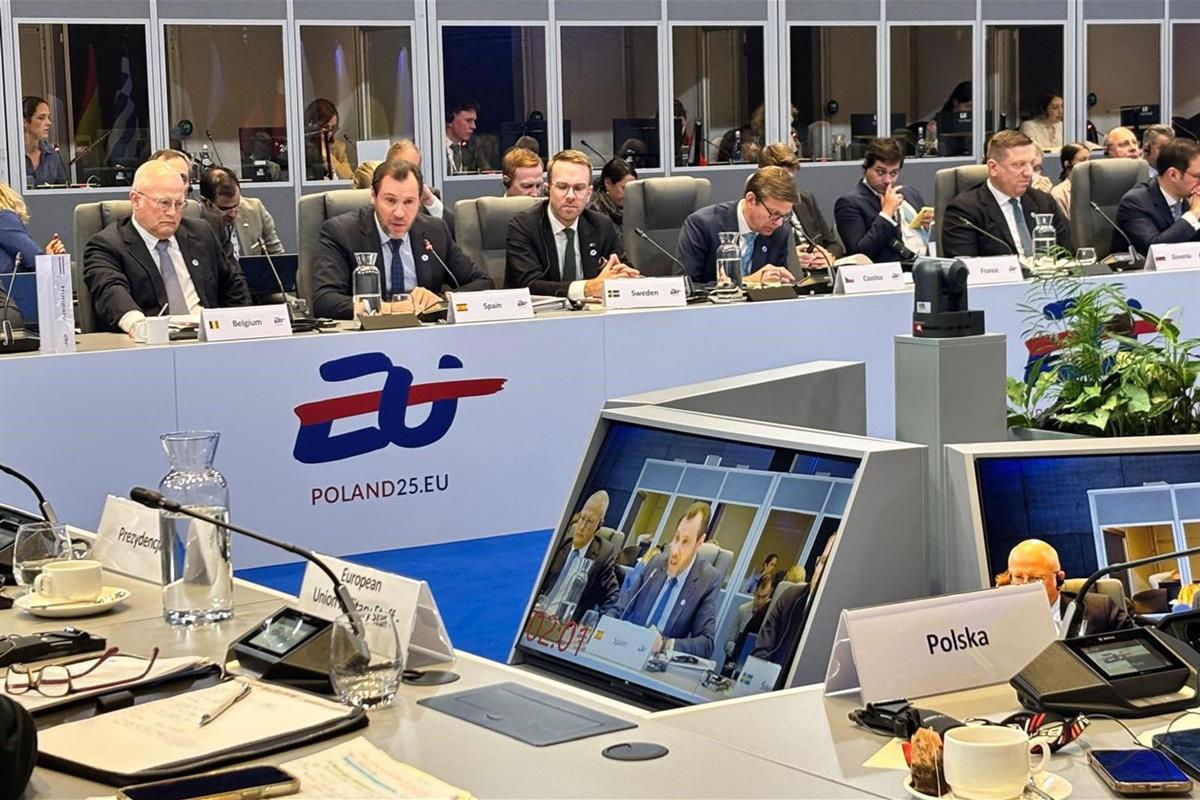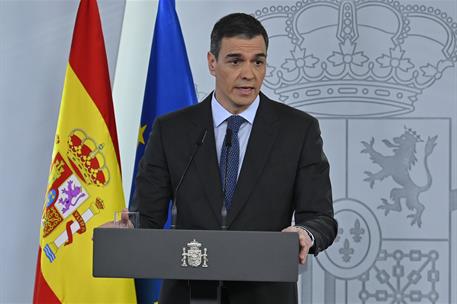Óscar Puente highlights the key role of transport in the development of the EU's defence and security strategy
News - 2025.3.18
 The Minister for Transport and Sustainable Mobility, Óscar Puente, speaks at the Informal Council of European Union Transport Ministers held in Warsaw
The Minister for Transport and Sustainable Mobility, Óscar Puente, speaks at the Informal Council of European Union Transport Ministers held in Warsaw
The Minister for Transport and Sustainable Mobility, Óscar Puente, asserted that the European Union must be more united than ever and show itself to be a strong bloc in a complex and uncertain geopolitical moment, where transport plays a key role in guaranteeing the alliance and the strength of the European Union.
"Today more than ever, we must orient our transport decisions towards the strategic autonomy of the European Union, a competitive green agenda and the security of our territory and our citizens. We have to look at the reality from a Community perspective", said Óscar Puente during the first working session of the Informal Council of EU Ministers held in Warsaw (Poland).
In this regard, Puente defended the importance of transport for the development of the EU's defence and security strategy and invited his counterparts to share and find solutions "to increase efficiency in the connectivity of the entire European transport system and to improve its competitiveness and resilience".
To this end, it is essential to have a Trans-European Transport Network that is seamless across borders and fully interoperable, allowing dual use and reinforcing transport cybersecurity, investing in advanced technologies to benefit from innovation and Big Data, minimising the risk of attacks that could lead to operational disruptions.
"The Government of Spain is giving great importance to the development of dual-use infrastructures. The transport sector must contribute to a robust European security strategy", the minister assured the informal meeting of ministers organised by the Polish Presidency of the European Union, where he reiterated Spain's solidarity with the Ukrainian people and the government's commitment to the security and defence of Europe.
The Informal Council of Ministers was divided into two working sessions, one focusing on dual-use infrastructures and the other on transport cybersecurity. The challenges and measures needed to boost development in both areas were discussed.
Dual mobility
The first of the sessions focused on addressing a common position on dual mobility within Europe.
In his speech, Óscar Puente stated that transport is a key element for the development of the defence strategy and, therefore, its investment must be aimed at facilitating military mobility, always through a responsible and efficient use of resources. In this context, he pointed out that it is necessary to complete the European Corridors as security and defence require a continuous and interoperable Trans-European Transport Network.
To achieve a dual infrastructure and facilitate military mobility, a holistic approach is needed and investment needs to be well designed.
The issues to be addressed are as follows:
- Strengthen coordination between the relevant transport and defence teams.
- These teams should carry out a joint, in-depth analysis of the infrastructure network and connections to the main entry and exit points for troops and military equipment, from a multimodal point of view and in cooperation with transport operators.
- Achieve an effective logistics network, in terms of capacity, connections, digitisation and common intelligence and security.
- Invest in the maintenance of the existing network to maintain the standards required for military equipment.
- Test the system for errors to ensure the resilience of the network in the face of a security threat.
Strengthening transport cybersecurity in the EU
The second working session was devoted to the challenge posed to transport by cyber security in the EU and building cyber resilient security.
As he announced in declarations on his entrance to the meeting, Óscar Puente is committed to the use of new technologies in the sector to improve its services and, at the same time, warns of the multitude of data that moves with sensitive information. Therefore, "we must ensure that this data is protected, that our transport systems take advantage of technology without being vulnerable".
The Transport Minister also highlighted the increase in cyber attacks, which are becoming more sophisticated every day, and that 2025 will be complex, so "we must prepare ourselves to respond adequately to these new threats, especially in the current geopolitical context".
With regard to this reinforcement in cybersecurity, the minister offered some examples developed in Spain, such as the National Cryptology Centre - Computer Emergency Response Team, the Ministry of Home Affair's Cybersecurity Coordination Office or, in the field of transport, Aena's Strategic Information Security Plan.
Thus, in order to prioritise cybersecurity in European programmes, it is essential to invest more in the implementation of advanced technologies in the transport network with a common approach, for which the creation of groups or forums where best practices can be shared and learn from each other is essential.
"Together we must work on mapping technology dependencies and implementing preventive and response protocols to make European public and private companies cyber-resilient. The establishment of harmonised regulatory tools and the application of the highest national and international norms and standards is vital to achieve European cybersecurity," said the Minister for Transport and Sustainable Mobility in his speech to his European counterparts.
Cybersecurity training
Lastly, Óscar Puente stated the importance of prioritising digital training in the field of transport and mobility, with continuous training and cyber-attack drills, involving all agents: operators, manufacturers, regulators and technologists.
Ultimately, investment in technology and training, public-private and Member State cooperation, and preparing our transport ecosystems for new threats are key to mitigating risks and ensuring the sector's cyber resilience.
Non official translation





